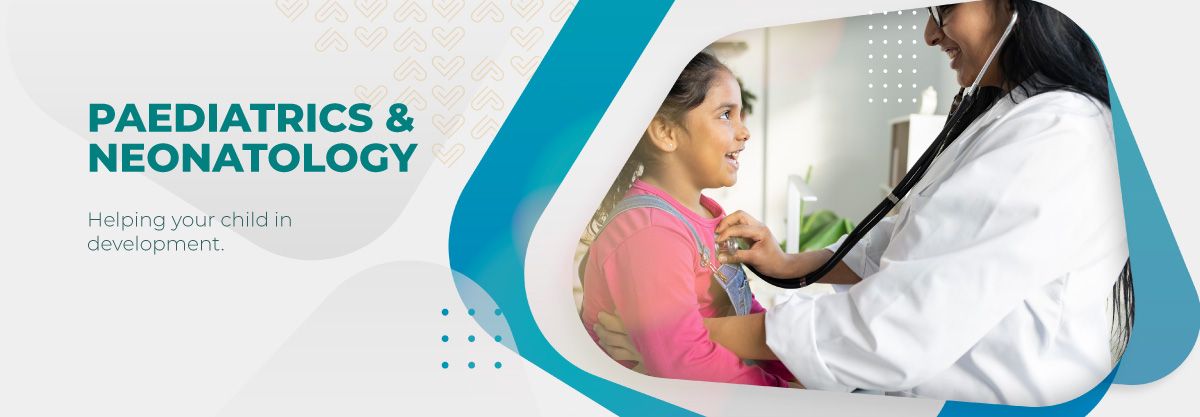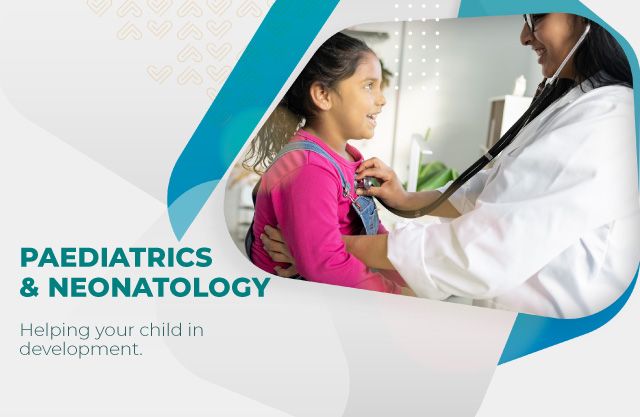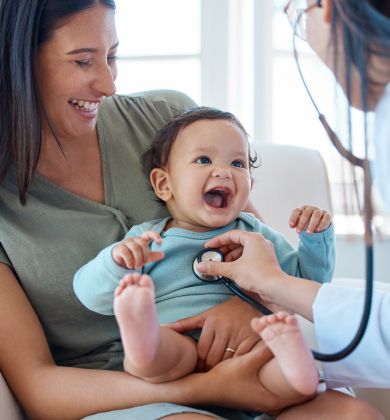Emergency Tel: 211 5157


- Home
- Specialities
- Paediatrics & Neonatology
Paediatrics & Neonatology

-
Overview
Our paediatric out-patient department is for children and their families. We operate six days a week for appointments with specialist paediatricians and have a comfortable seating. Our fast referral service means an appointment can be arranged with a paediatrician the same day. This model provides primary preventive paediatric care which addresses areas of well-baby check-ups, immunizations, developmental assessments, nutritional assessments, healthy life style and proper physical activities. If, following examination, your child needs to be admitted to the hospital, this can happen straight away.
Common conditions we treat include:
- Acute infections such as pneumonia, urinary tract infection, meningitis
- Allergic rhinitis and or hay fever
- Asthma
- Bedwetting
- Behavioural problems
- Bronchiolitis
- Constipation
- Croup
- Diarrhoea
- Eczema
- Feeding problems in newborn babies
- Fever
- Gastro-oesophageal reflux
- Headache and migraine
- Heart murmur
- Immune deficiency
- Jaundice in newborn babies
- Joint swelling
- Kawasaki's disease
- Poor weight gain
- Problems with immunisation
- Tonsillitis
- Uncomplicated primary epilepsy
- Urinary tract infections
-
Acute Gastroenteritis (AGE) or Stomach Flu
Viral gastroenteritis is an intestinal infection that includes signs and symptoms such as watery diarrhoea, stomach cramps, nausea or vomiting, and sometimes fever.
The most common way to develop viral gastroenteritis — often called stomach flu — is through contact with an infected person or by consuming contaminated food or water.
When to see a doctor:
See your child's health care provider right away if your child:- Has a fever of 102 F (38.9 C) or higher
- Seems tired or very irritable
- Is in a lot of discomfort or pain
- Has bloody diarrhoea
- Seems dehydrated — watch for signs of dehydration in sick infants and children by comparing how much they drink and urinate with how much is normal for them, and watching for signs such as a dry mouth, thirst and crying without tears
If you have an infant, remember that while spitting up may be an everyday occurrence for your baby, vomiting is not. Babies vomit for a variety of reasons, many of which may require medical attention.
Call your baby's doctor right away if your baby:- Has vomiting that is frequent
- Hasn't had a wet diaper in six hours
- Has bloody stools or severe diarrhoea
- Has a sunken soft spot (fontanel) on the top of his or her head
- Has a dry mouth or cries without tears
- Is unusually sleepy, drowsy or unresponsive
-
Bronchiolitis
Bronchiolitis is a common lung infection in young children and infants. It causes inflammation and congestion in the small airways (bronchioles) of the lung. Bronchiolitis is almost always caused by a virus.
When to see a doctor
If it's difficult to get your child to eat or drink and his or her breathing becomes more rapid or laboured, call your child's doctor. This is especially important if your child is younger than 12 weeks old or has other risk factors for bronchiolitis — including premature birth or a heart or lung condition.
The following signs and symptoms are reasons to seek prompt medical attention:- Audible wheezing sounds
- Breathing very fast — more than 60 breaths a minute (tachypnea) — and shallowly
- Laboured breathing — the ribs seem to suck inward when the infant inhales
- Sluggish or lethargic appearance
- Refusal to drink enough, or breathing too fast to eat or drink
- Skin turning blue, especially the lips and fingernails (cyanosis)
-
Hypospadias
Hypospadias is a birth defect (congenital condition) in which the opening of the urethra is on the underside of the penis instead of at the tip. The urethra is the tube through which urine drains from your bladder and exits your body.
Hypospadias is common and doesn't cause difficulty in caring for your infant. Surgery usually restores the normal appearance of your child's penis. With successful treatment of hypospadias, most males can have normal urination and reproduction.
Signs and symptoms of hypospadias may include:- Opening of the urethra at a location other than the tip of the penis
- Downward curve of the penis (chordee)
- Hooded appearance of the penis because only the top half of the penis is covered by foreskin
- Abnormal spraying during urination
Treatment
Some forms of hypospadias are very minor and do not require surgery. However, treatment usually involves surgery to reposition the urethral opening and, if necessary, straighten the shaft of the penis. Surgery is usually done between the ages of 6 and 12 months.
If the penis looks abnormal, circumcision should not be done. If hypospadias is found during circumcision, the procedure should be completed. In either case, referral to a paediatric urologist is recommended.
Surgery
Most forms of hypospadias can be corrected in a single surgery that's done on an outpatient basis. Some forms of hypospadias will require more than one surgery to correct the defect.
When the urethral opening is near the base of the penis, the surgeon may need to use tissue grafts from the foreskin or from the inside of the mouth to reconstruct the urinary channel in the proper position, correcting the hypospadias. -
Patent Ductus Arteriosus
Symptoms
Patent ductus arteriosus symptoms vary with the size of the defect and whether the baby is full term or premature. A small PDA might cause no signs or symptoms and go undetected for some time — even until adulthood. A large PDA can cause signs of heart failure soon after birth. Your baby's doctor might first suspect a heart defect during a regular checkup after hearing a heart murmur while listening to your baby's heart through a stethoscope.
A large PDA found during infancy or childhood might cause:- Poor eating, which leads to poor growth
- Sweating with crying or eating
- Persistent fast breathing or breathlessness
- Easy tiring
- Rapid heart rate
When to see a doctor
Contact the doctor if your baby or older child:- Tires easily when eating or playing
- Isn't gaining weight
- Becomes breathless when eating or crying
- Always breathes rapidly or is short of breath
Risk factors
- Premature birth.
- Family history and other genetic conditions.
- Rubella infection during pregnancy.
- Being born at a high altitude. Babies born above 8,200 feet (2,499 metres).
- Being female. PDA is twice as common in girls.
Doctor Schedule
Doctors scheduled for the week.
| Monday & Wednesday | 11hr - 13hr | Dr Abdool M. Fouad |
Doctors and Specialists of Paediatrics / Neonatology
Contact Us
-

4, Labourdonnais Street,
Port-Louis -

(230) 211 5157
(230) 211 5181
(230) 211 7559 -

(230) 211 4647
Follow Chisty Shifa Clinic
Patients
Publications
Terms & Conditions | Privacy Policy | COPYRIGHT © 2022 Chisty Shifa.
All rights reserved. Powered by Nova Interaction


